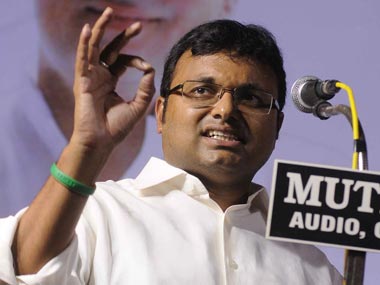Chennai: The Madras High Court reserved its order on Monday on the appeals moved by former Union minister P Chidambaram’s wife, son and daughter-in-law, challenging the prosecution initiated against them by the Income Tax Department under the Black Money Act. A division bench of Justice S Manikumar and Justice Subramonium Prasad reserved its order after recording the submission made by senior advocate Gopal Subramanium on behalf of the petitioners. [caption id=“attachment_3457132” align=“alignleft” width=“380”] File image of Karti Chidambaram. PTI[/caption] On 31 August, the bench dispensed with the appearance of Chidambaram’s wife Nalini, his son Karti and daughter-in-law Srinidhi before the special court for economic offences cases in Egmore till 14 September. The issue pertains to alleged non-disclosure of overseas assets and bank accounts held by the trio. According to the I-T department, the three had failed to disclose a property they jointly own in Cambridge in the UK, worth Rs 5.37 crore, which amounted to an offence under the Black Money (Undisclosed Foreign Income and Assets) and Imposition of Tax Act. The department has also alleged that Karti Chidambaram had failed to disclose an overseas bank account he holds with Metro Bank in the UK and investments he had made in Nano Holdings LLC, USA. He had also “failed” to disclose investments made by Chess Global Advisory, a company he co-owns, which amounts to an offence under the Black Money Act, the department has said in its complaint filed in the special court in May this year. Assailing the prosecution, the three approached the high court. As a single-judge bench refused any relief, they moved an appeal. On 27 June, the first bench headed by the then chief justice Indira Banerjee reserved its order on the appeal. However, as Justice Banerjee was later elevated to the Supreme Court, orders could not be pronounced. The appeal was then referred to the bench headed by Justice Manikumar for fresh hearing. During the hearing by Justice Banerjee, counsel for the appellants had contended that prima facie, no offence can be made out against them under the Black Money Act. The act deals with undisclosed income raised from foreign assets. But in the present case, all the relevant information had been disclosed by the petitioners in their returns filed under the Income Tax Act, the counsel had said.
The black money case against the Chidambaram family pertains to alleged non-disclosure of overseas assets and bank accounts, according to the I-T Department.
Advertisement
End of Article


)

)
)
)
)
)
)
)
)



